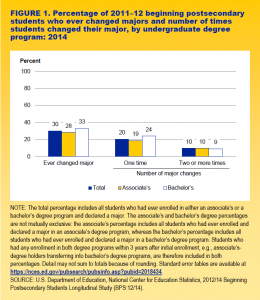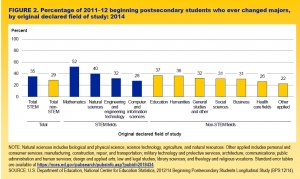Some students arrive on campus with a clear idea of their future career. Others are unsure of a major, or they know what they want to study but don’t know how their major will translate to a job. During their college years, most students discover new interests and learn about career possibilities they had never imagined.

Career planning is a process. At least a third of college students refine or change their goals within the first few years of starting college (PDF) and students enrolled in Science, Technology, Engineering, and Math (STEM) programs are the most likely to change majors (PDF).

It’s not unusual for students to recognize that the career choice they first considered may not be the right option. Often, by taking a class, volunteering, or doing an internship, they may realize their skills and interests are a better fit for an entirely different field.
What my parents think of as success is the traditional, stereotypical things, not realizing that there’s actually a whole lot of majors and whole lot of different things I can do that may be more tailored towards my interests and what success means to me personally.
Parents’ Role

When students consider changing their major, they think about how their parents will react. It’s not uncommon for students to say, “I want to change my major, but my parents will be so disappointed. I picked my college because it has a good major for what I thought I wanted to do. How can I tell them I want to do something else, and maybe this isn’t even the right college for me anymore?”
Helping your student through the career development process can be challenging. Walking a fine line between providing support and encouragement–without doing too much of the work for your student–is a difficult balancing act. Some ways that you can help:
- Let them know that you understand they may change their career goals as they go through college
- If they express interest in a class outside their major, ask what excites them about that class; ask if it’s something they might want to pursue
- Encourage them to explore new interests by talking to a professor or joining a student group related to the topic
Parents do have some important insights that can be helpful as their student considers a future career.
- You know your student best; you know your student’s strengths and weaknesses and what excites him or her
- Talk to your student about those interests and encourage exploration of related courses and volunteer experiences
- Help your student understand that career decisions are a process
Hearing that I changed my major, my parents were worried I would switch career paths and get a degree I would not be able to use in the end. So that was an issue between me and my parents when I decided to switch majors. The first one didn’t click so well.

Good decision making and the creation of a successful plan are seldom linear. They involve an on-going process that will last beyond graduation. That process includes multiple steps that students will rethink again and again:
- Self-Assessment: “What do I like to do? What am I good at? What have I accomplished that I’m proud of? What kind of lifestyle do I want for myself?” Often students don’t recognize their own skills and talents. They think that if something is easy for them (drawing or writing, making people laugh, listening to their friends’ problems), it’s probably easy for everyone or it’s not particularly important. Parents and teachers often can see a student’s talents better than the child can.
- Explore options: “How do my interests and skills match up with different careers?” While self-assessment can be purely personal work, students can ask their career adviser for suggestions of assessment tools that will provide insights on types of work that fit their interests and goals.
- Explore opportunities: “How do I know that I could do some of these jobs? Do I really understand what the work is like?” Professors can help students understand what types of jobs are likely to be available for graduates in their field of study and may know of student organizations related to the major. A career office on campus can suggest volunteer opportunities, match students with a mentor, or help identify part-time jobs that allow students to experience the kind of work they’re studying for.
- Goal-setting: “What steps do I need to take to get where I want to go? When do I need to do which steps? When will I review my decisions and consider what comes next?” A concrete plan is helpful, with an outline of tasks and dates. Goals can be broken down into small, realistic, and achievable steps. Students can show their plan to a career adviser, who will provide specific advice on what will move them toward their goals.
As students approach their ultimate goals under this process, they should start the cycle over again, considering whether they still enjoy the major or the career they selected; what new skills they have developed; what they have accomplished so far; and whether the career fits with the lifestyle they want to live. They should consider new options and establish goals for their next steps.
It’s definitely okay to procrastinate a little bit on choosing your major or career goals, or you might end up with something you don’t like and there goes your four years.

